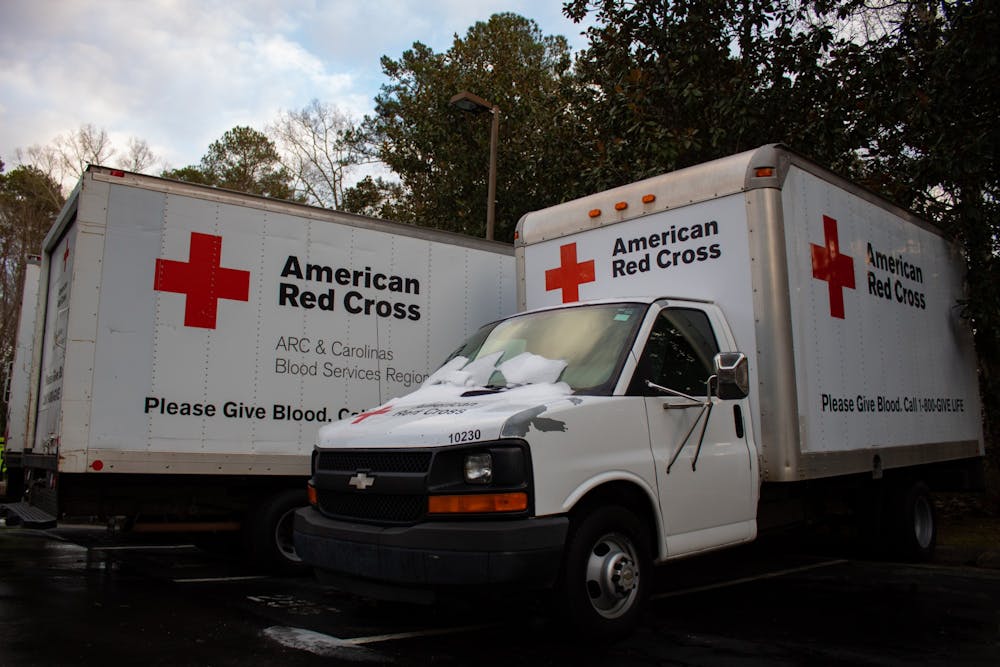“We monitor the inventory daily and some days, we’re lower than we’d really like to be," she said. "We haven’t gotten to the point where something had to be canceled, so we’re doing pretty well despite the national shortage because of the stewardship that we have.”
However, Weiss said the national shortage is “severe” and that UNC Health is receiving about 25 percent less blood than normal. She said they have been using blood cautiously to avoid any cancellations of essential procedures.
Ellen Kirtner, the partnerships and media coordinator at The Blood Connection, which organizes blood drives across the state, said that blood donor turnout has been low for about 10 months.
Kirtner also said recent winter weather has adversely affected blood supply.
“When we’re not able to host these blood drives or have our centers open, that definitely has an impact on our collection,” she said.
Combatting the shortage
In response to the shortage, Gov. Roy Cooper declared January as Blood Donation Month and encouraged North Carolinians to donate blood in a Jan. 13 press release.
“Giving blood is a safe and effective way to help your community,” Cooper said. “With the rise in COVID cases across the state, it’s more important than ever that we do our part to help our hospitals.”
Bandarenko said Duke University Hospital is working to help combat the shortage by increasing the number of blood drives on the Duke University Hospital campus.
Additionally, Weiss emphasized the need for community members who are able to give blood to do so.
"It’s an easy thing to do," she said. "People can do it and give back to the community."
Pickett said she gives blood because she is healthy and capable of doing so.
To get the day's news and headlines in your inbox each morning, sign up for our email newsletters.
“This is a tough time for many of our neighbors and our community members who aren’t healthy and who aren’t able to give blood," she said. "This is something we can do to give back to them to keep them healthy and alive.”
Kirtner said that even if someone chooses not to donate or is unable to, they can still support the cause.
“We just ask that you help share the message because you never know what that message could do for someone else," she said.
Eligible UNC students can donate at the Blood Donation Center, located on campus inside UNC Medical Center.
The American Red Cross and The Blood Connection also operate several blood donation sites in the Raleigh-Durham area.
FDA policies exclude many gay men from donating blood
Despite the severe shortage of blood donors, many gay and bisexual men are currently unable to donate blood because of longstanding federal restrictions.
For decades, the U.S. Food and Drug Administration had placed an outright ban on gay and bisexual men donating blood due to concerns surrounding HIV transmission during blood donation.
In 2015, the FDA revised its policy to permit blood donations from gay and bisexual men if they had not had sexual contact with another man for 12 months.
The FDA once again revised the policy in April 2020 to allow donations from the same individuals if they had not had sexual contact with another man for three months.
Terri Phoenix, director of the LGBTQ Center at UNC, said the FDA’s policy treats individuals with similar risks differently, based solely on their group membership.
“A woman who has had unprotected sex with multiple partners over the same timeframe with no knowledge of their personal histories can still donate blood," T said. "But men who have sex with men are barred.”
According to a 2010 study from the Centers for Disease Control and Prevention, the risk for acquiring HIV through blood transfusion is about one in 1.5 million. The study stated that questionnaires and laboratory screening tests both help mitigate the risk for transfusion-transmitted HIV infection.
A 2014 study conducted by The Williams Institute at the University of California, Los Angeles found that lifting the restrictions at the time — which was a complete ban on gay and bisexual men donating — could lead to a 2 to 4 percent increase in the total annual blood supply in the United States.
Powell Marshall, the vice chairperson of the Board of Directors for the LGBT Center of Raleigh and the director of facilities shared services for the UNC College of Arts and Sciences, said that he is excluded under the current recommendations and emphasized that he would love to be a donor.
“I think most people that care about the community and care about people would love to do so,” Marshall said.
Phoenix said T has received a lot of contact from individuals who would like to donate, but are unable to do so.
“Whenever we have Red Cross blood donations on campus, I receive a lot of contacts from folks that are upset about the deferral (of three months)," T said.
The FDA is currently funding a pilot study with the American Red Cross and other organizations to gather data on the use of individual risk assessment questionnaires, according to the American Red Cross website.
Marshall said the FDA should expedite the project and change its current policies.
“We have enough stigmatization in our own community as it is," he said. "If we could get at least one other barrier down, it would help.”
@ianwalniuk
@DTHCityState | city@dailytarheel.com




